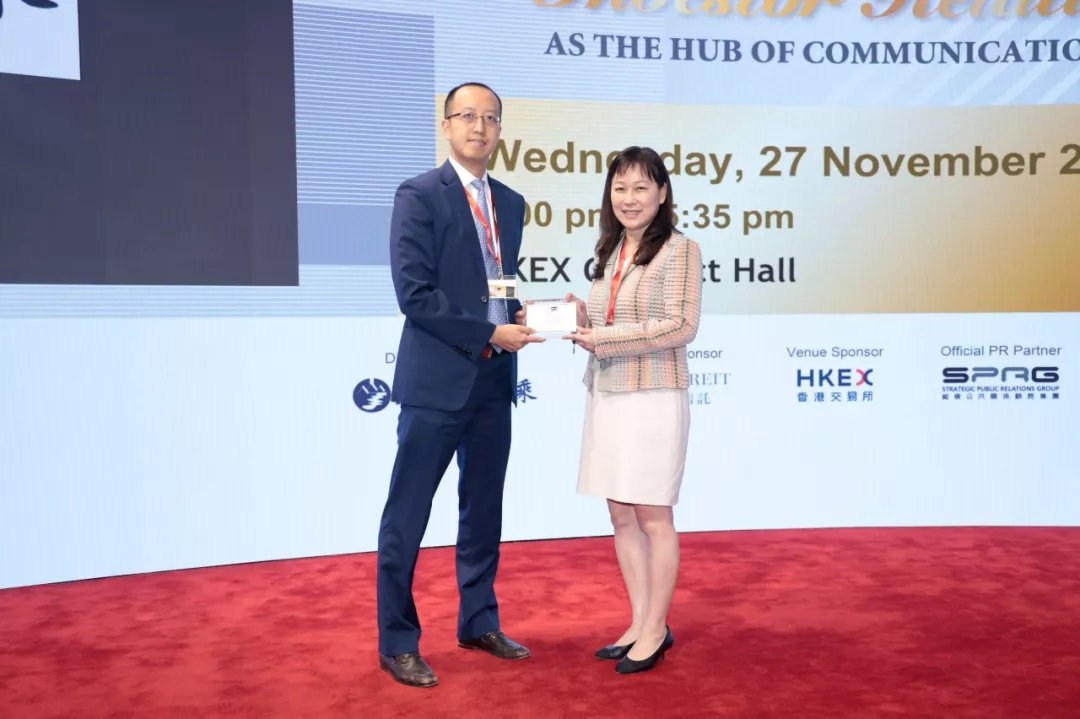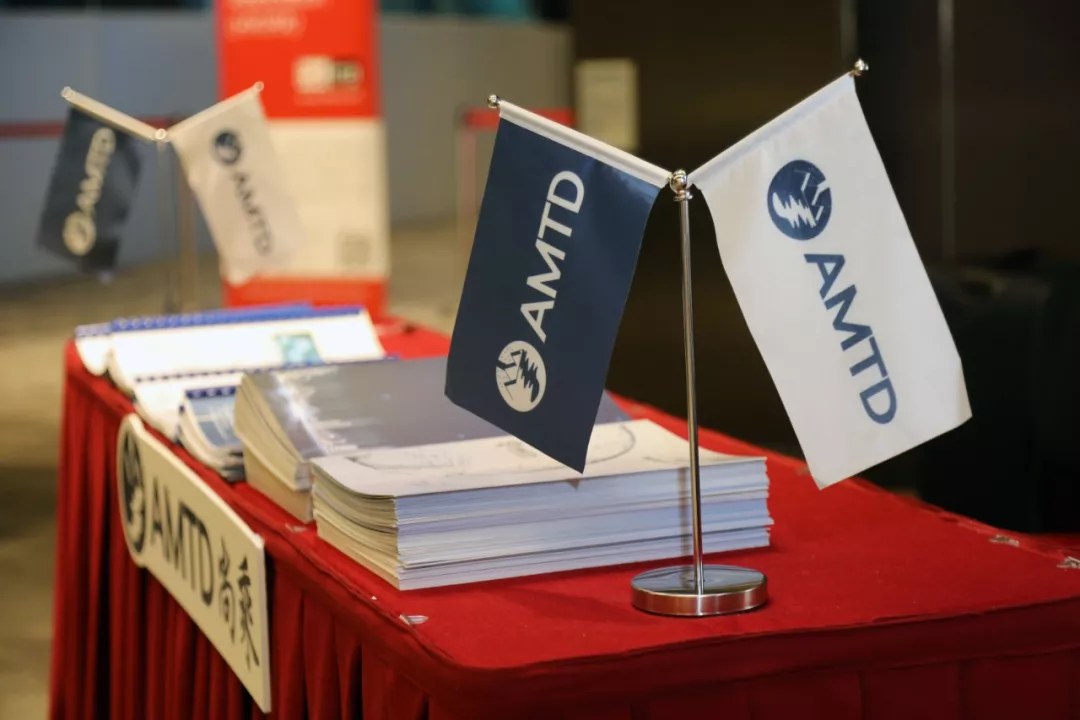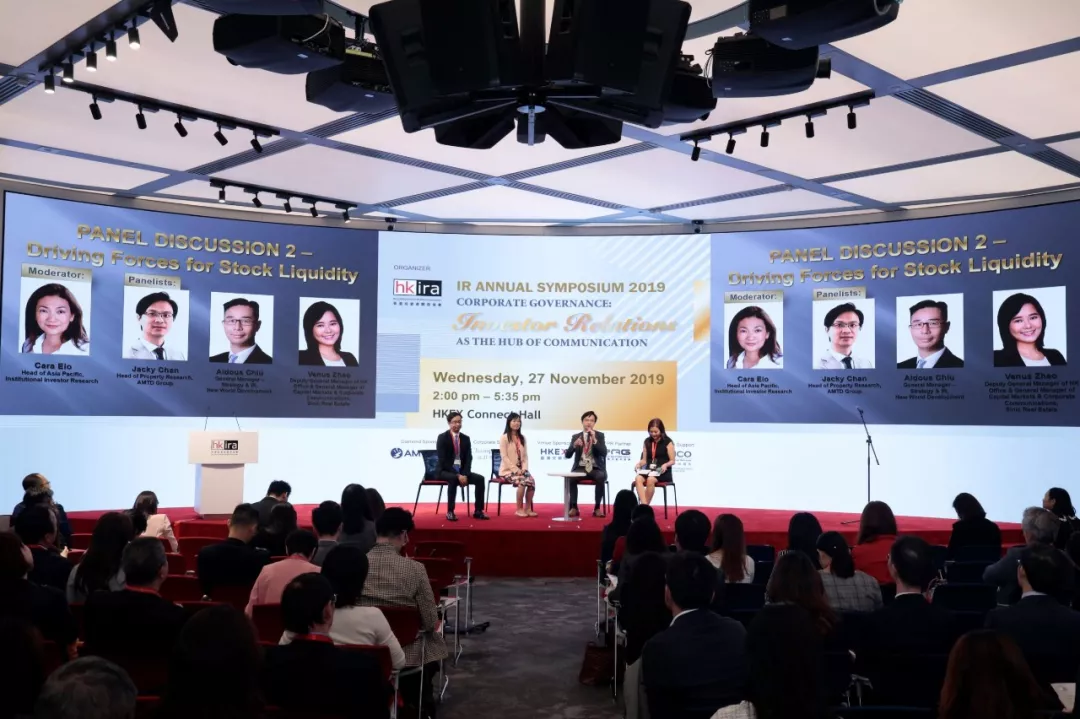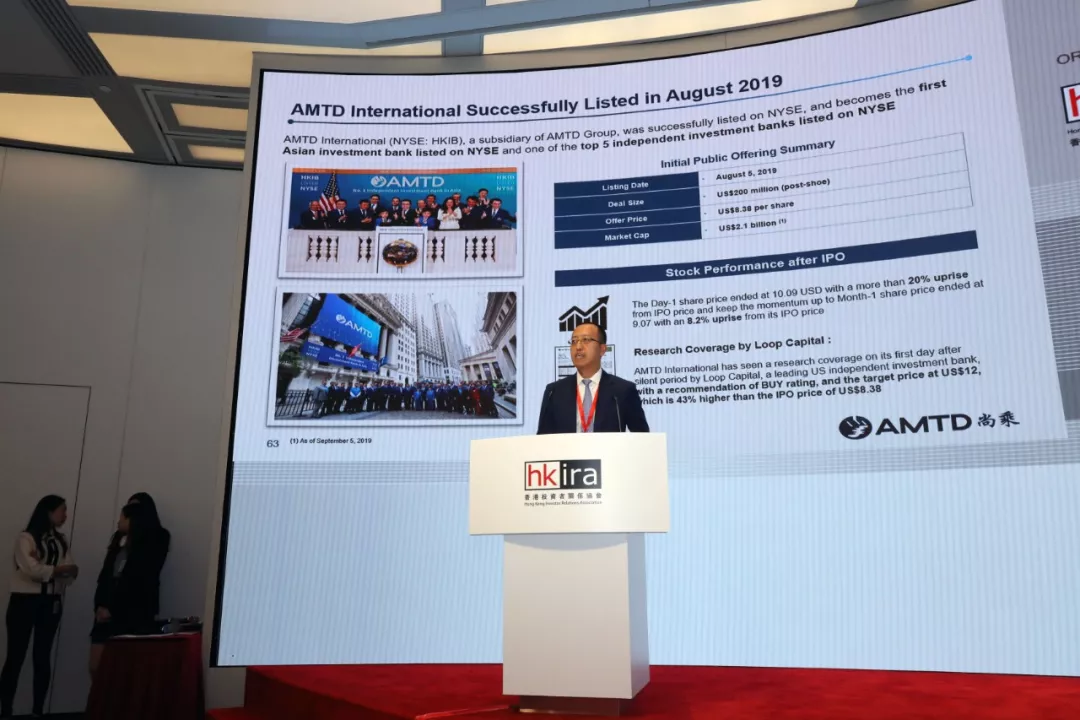In the afternoon of November 27, AMTD Group, as the diamond sponsor, participated the IR annual symposium hosted by the Hong Kong Investors Association. The theme of the conference was “Corporate Governance: Investor Relations as the Hub of Communication”, and participants discussed on investor relations management strategies and opportunities, and how to improve the stock liquidity, etc. William Fung, Group Vice President of AMTD Group, and Jacky Chan, Head of Property Research, attended the annual symposium as guest speaker and panelist, respectively, and shared unique views of AMTD Group, the largest independent investment bank in Asia, on the capital market.


To kick off the event, Eva Chan, Chairman of the HKIRA, made an opening speech by first welcoming all the guests and thanking the event’s diamond sponsor, AMTD Group, for supporting the event. Eva then mentioned that in recent years, competition in the international capital market has become increasingly intense, and the investor relationship management of listed companies has become increasingly important. Eva pointed out that, in order to help listed companies better manage investor relationship, HKIRA has published a guide book, and has been providing training courses on investment relationship management, hoping to promote the relationship between HK-listed financial companies and investors.
Then, Wilfred Yiu, Managing Director & Head of Markets of HKEX, gave a keynote speech about the current situation of Hong Kong’s capital market. Wilfred believed that how to maintain good investor relations is an important issue for listed companies. He also mentioned that since the listing reform took place last year, more than 40 new economic companies have now listed on the Stock Exchange. Hong Kong, as a bridge between China and the world, will continue to strive to create a transparent and efficient market environment, and promote the healthy development of financial markets.

Cara EIO, Head of Asia Pacific of Institutional Investor Research, moderated a panel discussion on “driving forces for stock liquidity”. Jacky Chan, Head of Property Research of AMTD Group; Aldous Chiu, General Manager of Strategy and IR in New World Development; and Venus Zhao, Deputy General Manager of HK Office and General Manager of Capital Markets and Corporate Communications in Sinic Real Estate, had an in-depth discussion on how to improve the stock liquidity of listed companies.
Jacky Chan, Head of Property Research of AMTD Group, started from the three main aspects – the company, analysts, and investors, to explore the methodologies of improving the stock liquidity of listed companies based on three dimensions: fundamentals, seller coverage, and public ownership. First of all, the fundamentals are essential. Since investors usually make trading decisions based on industry average valuations, improving the financial performance and increasing the growth rate are the keys. They are also the reasons why analysts choose to cover a certain company. Secondly, the analysts’ research reports are important basis for investors to sort out the company’s business and growth logic. Profit expectations are the main reference for investors to conduct the company’s valuation. The company requires to provide the market with information about “reasons for growth” and “future growth expectations in the following 1- 3 years” through analysts’ reports. Finally, increasing public holdings can also increase stock trading volume. Thus, the company can flexibly use stock financing instruments in suitable market conditions. Jacky Chan took the China Aoyuan Group covered by AMTD as an example, and traced the company’s capital market performance to further explain the above opinions in detail.

Aldous Chiu, General Manager of Strategy & IR, New World Development, pointed out that the basic goal of adding stock liquidity is to boost share prices. Companies must identify their market positioning and strategies, and specify how to develop themselves as well as how to grow, to earn notice from the capital market and stand out from their peers – it is also important for entering analyst coverage. When it came to the impact of regulations on liquidity, Aldous Chiu believed that the key is to establish a fair investment environment, enable free flow of capital and ensure information transparency. Venus Zhao, Deputy General Manager of HK Office and General Manager of Capital Markets & Corporate Communications, Sinic Real Estate, summarized on her experience that small-cap companies suffer more from low liquidity, and there are five factors affecting liquidity: how companies respond to investors’ questions, information transparency, shareholder structure, analyst coverage and media exposure. At the corporate level, companies could try to be included in an index to improve its exposure; communicate with different brokers to reach different types of investors; provide as detailed information as possible to assist in sell-side analysis, given the latter’s workforce and financial constraints; interact with investors through highly frequent roadshows to understand investor types and strategies – for example, companies could improve stock liquidity by introducing hedge funds investors.

William Fung, Group Vice President, AMTD Group, gave a closing presentation on “2020 Capital Market Outlook”. Both investment-grade and high-yield bonds have a YTM of over 10% – though the default rate is rising due to the tighter domestic policy, the default rate has topped and the overall bond market is prosperous. William Fung believed that the 2020 bond market will be relatively weak, as enterprises financed in advance due to the macro uncertainties, including the intensified China-U.S. trade war, the slowing down of China economy, the 2020 U.S. presidential election, Brexit and other geopolitical events. Besides, the tighter policy of China NDRC resulted in a tight supply of China property, which also led to a weaker bond market. In terms of investment-grade bonds and high-yield bonds in 2020, William Fung said for investment-grade bonds, bonds issued by state-owned enterprises and local government will be preferred as they are backed by the national credit; while for high-yield bonds, bonds issued by property developers shall be the first choice as the China property companies will pursue high-quality development considering stricter regulations and a drop in property supply. As the largest independent investment bank in Asia, AMTD Group has rich experience in debt capital markets. For the purpose of better understanding and serving customers, AMTD Group conducted a survey with 50 bond investors, including money funds, hedge funds, insurance companies and banks from Hong Kong, mainland China as well as overseas. William Fung shared the results of the survey with attendees. The results showed that among the respondents, 80% of investors achieved a positive return of 7% – 15%, and more than 75% of investors would choose a neutral or conservative investment strategy at the end of the year; investors prefer B- or BB-rated bonds issued by Chinese property developers; for investment-grade bonds, investors prefer short-term or perpetual bonds, while for high-yield bonds, investors prefer bonds with maturities of less than 3 years.


